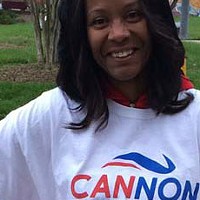About 25 members of NC Vote Defenders, a newly formed advocacy group, hit the streets Tuesday, visiting precincts throughout the city to educate voters on a new law that will take effect in 2016.
Members hit 12 precincts that they believed would be most frequented by minorities and younger voters, groups they said will be most affected in coming years by North Carolina's new voter-ID law. Assuming it survives lawsuits filed by social-justice groups, by 2016 the law will require voters show identification before voting, among other changes.
Bryan Perlmutter founded the group in August, the month the law passed. Tuesday's election, during an expected low voter turnout year, acted as a test run for the new advocacy group to learn the most effective tactics and get used to organizing.
"We want to advocate in 2013 and then continue to get ready for 2014, when there will be a much higher turnout," said Perlmutter, 22.
The group encountered mostly minor problems locally on Tuesday: parking lots at capacity, a lack of curbside voting and confusion from voters about how to get to the polling place from the parking lot.
Members reported any problems they found to the Mecklenburg County Board of Elections. Perlmutter said the board responded to all of their concerns and fixed what they could.
NC Vote Defenders caught word of more distributing problems in Boone, where there had already been some controversy leading up to the election. In August, the Watauga County Board of Elections voted to combine three precincts in the small mountain town into one, forcing Appalachian State University students and other residents to share two polling places.
According to election officials, of the 122 ballots collected at one site, 59 of them were provisional. NC Vote Defenders in Boone found that some students who had changed their voter registration in class were not on the roll, and others were being told they would have to walk the couple of miles to the next polling place or their provisional ballot would probably not count.
Elena Everett, spokeswoman for the NC Vote Defenders, reported problems to the Watauga County Board of Elections and corrected poll workers.
Perlmutter said that he plans to spend the next year training members and trying to network with other community organizations.
In west Charlotte, UNC Charlotte student and NC Vote Defender member Tyler Copeland stood in front of Wallace Pruitt in Recreation Center for hours in the cold. He said he was there to make sure people were aware of what the new laws really meant.
"The main thing that's publicized with this is the voter ID, and we want to get the word out that there is a lot of other stuff mixed in there," Copeland, 21, said. "I know a lot of people don't want to hear about it, whether it's apathy or they don't have the resources, so this is a good way to get the word out."
Along with requiring ID at the polls, the law also shortens the length of time early voting can take place, from 17 days to 10 days, puts stricter rules on absentee voting, and does away with touch-screen machines.
At Nathaniel Alexander Elementary School on Tuesday, some voters came in ready for a fight. One man stood in the nearly empty polling place for almost an hour, arguing with judges about the fact that he was made to state his name and address after already writing it on a card - a longtime requirement that is not related to the voter-ID law. He said he was "pissed off" and felt he was being harassed.
A woman standing outside the polling place did not see the man's reaction but said that she felt very uncomfortable as well when asked to state her information.
"We are just average people who are hard workers," said Blanche Penn. "Now we have to put aside time to learn these laws. When did that become law?" Penn added that laws demanding voters do certain things, such as state their name and address, should be posted at the polling place entrance.
Kristen Mavromatis, a spokeswoman for the Mecklenburg County Board of Elections, said she has heard people's complaints regarding this law for quite some time.
"That's the law. Every voter has to do it," she said. "It does frustrate people, but it's been that way for years and years and it has nothing to do with [the voter-ID law]."


